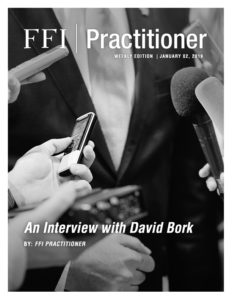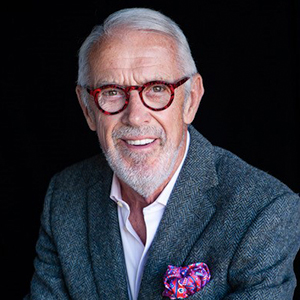
View this edition in our enhanced digital edition format with supporting visual insight and information.
Welcome to the first issue of the 2019 FFI Practitioner. What better way to look forward than to talk with one of the founders of the family enterprise field? We hope you enjoy this interview with David Bork, a legend in the field and, 50 years later, still a pioneer.
FFI Practitioner: David, tell us a bit about your thoughts on the family enterprise field as you look back on all that has been accomplished.
David Bork: 2018 was a year of introspection for me, and I’ve spent some time looking back on a half-century career of working with families in business. This thought-work created the structure of my recently released online course, Re-Imagining Relationships for Families in Business. Having to first distill, then organize those principles that I know for sure get results when working with legacy business families took me quite a long way down memory lane. I realized that, when we came to see the overall impact of family businesses in global terms, then our consulting and support profession really gained depth and structure.
What I came to know for sure after months of reviewing my years of consulting to create my online course was this: it’s the transfer of knowledge that is critical to sustaining family enterprise.
Too often family businesses will slide into a sustainability crisis because they have been focused on “who sits where” rather than “who knows what.” Remembering my various families and their challenges, I examined what solutions I offered that had worked and what should have worked but did not. Consistently, a crisis would resolve when the family found clarity on how knowledge of that business’ success formula was being transferred, and to whom.
Such clarity can ease inter-family tensions about who is best qualified to lead. As the readers will know, succession in family business is not usually an event. Nor is it a ceremony to announce who will get the corner office, or who will next head the family conference table. Succession is the process of transferring key family business knowledge. It seems reasonable to me to suggest that understanding the win/win in this process will also apply to business organizations in general. We urge the families we consult with to apply mutual respect and attention to both the wisdom and experience of the former or current generation and the energy and educations of the next generations.
FFI Practitioner: Tell us more about the core beliefs that still drive your consulting work 50 years later.
DB: I’ve always believed that change is good and in fact, the willingness and ability to change is pivotal to my own work with families. Over the many years, I have seen time and again that the absolute bedrock of any successful family business is the network of familial relationships. As I’ve outlined in my course, the platform of a successful network is supported by the four conceptual pillars of Alignment, Boundaries, Communication, and Competency. These four pillars are a combination of both science and emotion, and I’ve parsed the ever-evolving research on all four into a self-paced, learn-the-basics online activity. A commitment to knowing the Four Pillars can lead to very productive family member (or business associate) collaborations. And designing this course has been fun for me!
FFI Practitioner: How did this trip down memory lane inform your ideas on the role of a professional organization such as FFI in the development and transfer of knowledge?
DB: Well, the October 2018 FFI annual conference in London provided some food for thought. It’s my perception that fewer and fewer of the more senior players in the Fam Biz orbit participate in the family enterprise get-togethers. Using the FFI conference as an example, I asked FFI for some statistics on the conference attendees. Here they are:
- Geographic distribution: 36% from the US & Canada, 43% from the UK & Europe, 10% from the Pacific Rim, and 11% from the rest of the World
- Fellows: 23% were FFI Fellows
- FFI Global Education Network (GEN) grads: 40%
- Longevity in FFI:
- 72% of attendees joined within the last 10 years,
- 20% joined 11 to 20 years ago
- 5% joined more than 20 years ago
I was especially pleased to see many Spanish-speaking participants and to hear from my friend, Javier Macias, that there is now have a formal group called Club Asesores Empresa Familiar. I also noticed a significant number of attendees from the Middle East, and it delights me to know that FFI is truly an international association. I give Judy Green full credit for leading the organization in this direction. She had the vision.
FFI Practitioner: So, what are some things that FFI and the field in general might think about in 2019 and beyond?
DB: I would gauge that the median age at the London conference was between 35 – 55, and I believe our younger members could have benefitted if more of the original and seminal thinkers in our profession were there to mingle, to answer questions, and to chat about the challenges of the work.
I feel strongly that it is a responsibility of being an elder to personally facilitate the transfer of knowledge in the field. Showing up, speaking, sharing, and being available is an expression of my own gratitude for the extraordinary experiences I have had doing this work. And, personally, I would enjoy seeing more of this mix at all professional get-togethers.
Clearly our professional family, inside and outside of FFI, is getting larger and more complex. Maybe it is time to follow our own professional advice and ask ourselves how we proceed as we seek to perpetuate various formulae for success—encouraging the elders who had the vision thirty years ago to participate in the transfer of knowledge. And hoping they accept the challenge!
About the contributor
 David Bork is an FFI Fellow and an internationally-acclaimed family business consultant, author, and speaker with five decades of experience providing guidance to over 500 family business enterprises. He recently published an online course: Re-Imagining Relationships for Families in Business. As a pioneer in the industry, David brings a wealth of knowledge and insight to the many challenges of running a successful family business and has assisted families in charting their way through every imaginable family business issue. He is the author of The Little Red Book of Family Business, and the groundbreaking Family Business, Risky Business. For more information about David Bork, visit FamilyBusinessMatters.Consulting.
David Bork is an FFI Fellow and an internationally-acclaimed family business consultant, author, and speaker with five decades of experience providing guidance to over 500 family business enterprises. He recently published an online course: Re-Imagining Relationships for Families in Business. As a pioneer in the industry, David brings a wealth of knowledge and insight to the many challenges of running a successful family business and has assisted families in charting their way through every imaginable family business issue. He is the author of The Little Red Book of Family Business, and the groundbreaking Family Business, Risky Business. For more information about David Bork, visit FamilyBusinessMatters.Consulting.

View this edition in our enhanced digital edition format with supporting visual insight and information.





